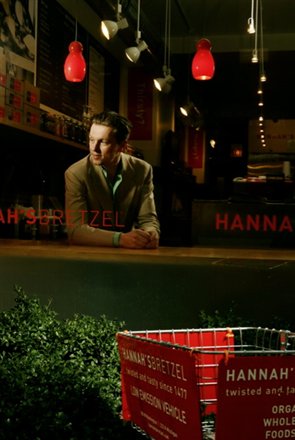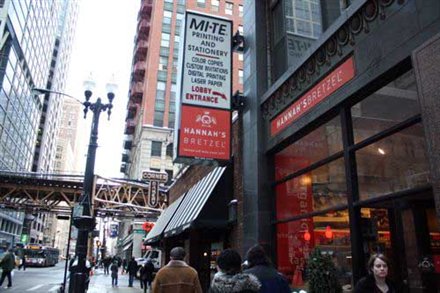Florian Pfahler of Hannah’s Bretzel
With the prolonged recession forcing some eateries to scale back or close, Hannah’s Bretzel LLC, an organic-sandwich shop with two Loop locations, is moving forward with plans to open its third spot next month at 131 S. Dearborn, just a few blocks from its other storefronts.
The fast-casual restaurant is known for its “uber” sandwiches, piled with organic and local veggies, cheeses and meats. These ingredients are stacked between a house-made “bretzel” (the German word for pretzel) or multigrain bread.
This week, Hannah’s Bretzel made the list of finalists in Mayor Richard M. Daley’s GreenWorks Awards for 2010, sponsored by the city of Chicago’s Department of the Environment. Florian Pfahler, the German-born entrepreneur who launched Hannah’s in 2005, was one of nine finalists in the Innovations in Green Business category. In a Fast Pitch competition Tuesday night at the Merchandise Mart, Mr. Pfahler had three minutes to convince a panel of judges and audience members that his company should take the top prize. The winners will be announced sometime in November.
Mr. Pfahler, 46, left his advertising job at Leo Burnett to open the first Hannah’s Bretzel at a time when he believed people were searching for nutritious fast food as part of a healthier lifestyle.
He lets his customers know where their food comes from and posts calorie counts. For example, the organic turkey and farmhouse cheddar sandwich has fresh apple crisps, organic field greens and roasted red pepper aioli; comes on an organic bretzel baguette; has 460 calories, and is 71.8% organic. In addition, about 95% of his packaging materials are compostable and biodegradable — what Mr. Pfahler believes is essential for any food business that dares call itself green.
Hannah’s Bretzel at 180 W. Washington (photo from the Serious Eats blog)
Revenue is up 30% this year over 2009. The catering portion of his business currently represents about 25% of that total and is expected to keep growing. Mr. Pfahler has plans to continue expanding in the Loop and beyond in the next couple of years.
Crain’s met with Mr. Pfahler recently to discuss the challenges of running a green business in a food sector that produces lots of waste and finding the same organic produce for his signature sandwiches week after week.
Crain’s: How is it possible for you to expand your business in a tough economic environment when other eateries are cutting back or trying to hold onto the customers they’ve got?
Mr. Pfahler: When I started this business, I saw a consumer trend that people were pursuing a healthier lifestyle, and some marketing studies showed they’d eat healthier if the food was tasty. We focus on organics and whole-grain nutrition. I never say we make the tastiest sandwich in Chicago. We let our customers say that. I’m expanding because we show solid growth in customers, in average check and in revenue.
Crain’s: You emphasize that sourcing organic foods and using eco-friendly products are as important to you as earning a profit. How do you balance those multiple goals?
Mr. Pfahler: We look at the cost of doing something a conventional way and then doing it the green way. Our food, packaging and beverage costs are between 30% and 40% higher than conventional products, so we come up with a number for our prices that represents the difference. But if we do this, we need to be transparent about our commitment to organics, nutritional information and the biodegradable products we use. That creates an environment that allows us to charge a premium, and the customers that we attract are ready to help us finance all that.
Crain’s: Customers who come into a sandwich shop expect the same ingredients in something they’re used to ordering week after week. How do you provide that kind of consistency when sourcing organic and local products is sometimes less reliable than buying conventional foods?
Mr. Pfahler: If you eat at a restaurant like Blackbird, you go back two months later and you don’t want to have the same thing again. You want seasonal stuff, and that affords them to be more flexible. In my business, it’s all about consistency — people want that same sandwich day in, day out. If I tell them I don’t have tomatoes today because my local producer didn’t bring me any, they’ll look at you like you’re from the moon. The expectation is that we will have it.
Our choice is organic first, local second; third would be just available non-sprayed, and fourth is conventional. When we started five years ago, it was much harder to get consistency in organic products. Today, the market is much broader and we can source organic ingredients from five or six vendors. We work with local farms, including Genesis Growers (St. Anne), Kinnikinnick Farm (Caledonia) and the Green City Market. It’s been more challenging in the winter, so we go with Testa (Produce, a Chicago-based distributor).
We want Testa to create a cooperative for produce because it makes no sense for me to establish relationships with many little farmers. If a farmer tells me it’s raining today and they have no tomatoes, I might have to hop in my Mini Cooper and go to Whole Foods to get tomatoes. But we’re in a much more reliable place of sourcing today than when we started.
Crain’s: What’s the biggest challenge in trying to be a green business in the fast-food sector of the restaurant business?
Mr. Pfahler: We don’t generate a lot of food waste, most of it is in packaging — napkins, bags. Our bags used to be made from paper in Germany that was printed in China, shipped to California and then driven across the country. A customer in our store says, “Give me that sandwich,” we put it in a bag, they go sit at the counter, eat the sandwich and then they dump the bag into the trash. What a waste of energy — it irked me every time. Now the paper is printed and made in Illinois by a company that recycles 99% of its own waste. That paper is also compostable and biodegradable.
A lot of food companies that say they’re green really shy away from the core, which for me in the fast-casual food business is the waste generated in packaging. Lots of people in the food business are green in many areas, but they still have plastic, non-recycled napkins and styrofoam. That’s not a green restaurant to me, I don’t care what kind of labels they have in their window.
Crain’s: Did you have similar packaging issues on the catering side of your business?
Mr. Pfahler: Yes. In the very beginning, we bought wooden and porcelain plates from Crate & Barrel and used those for catering. We brought them to our customer, and when we went to pick them up, they were gone. Lots of people took them home because they thought it was lovely stuff. It happened a few times, but then we stopped.
So we switched to those big plastic trays, but they’re made from oil, and they probably came from countries we find questionable. The tray and a plastic dome was sent three blocks from here, they opened it up, they ate the food, then they dumped the tray. I hated that.
Now our catering packaging is biodegradable. It’s not pretty, but there’s only one style right now. It’s not up to my standards of design that I’d like to see, but I think it’s more important that it’s biodegradable.
Crain’s: So far, you’ve concentrated your sandwich shops in the downtown business district. Do you have plans to expand beyond the Loop?
Mr. Pfahler: We can easily open up seven or eight locations in the Loop before we split into neighborhoods, which we plan on doing. As long as the numbers are there and we don’t sacrifice the contract we have with our customers to provide fresh, organic food every day in a transparent way, we will be able to grow the business. I’d like to open three locations next year, and in 2012, I plan to open in New York, then Washington, D.C.
Of course, then there’s economic events that are out of my hands. It’s great to have plans, but talk to me in two years and I’ll tell you where I am.
~~~~~~~~~~~~~~~~~~~~~~~~~~~~~~~~
In other green news this week:
Steel manufacturer ArcelorMittal and the U.S. Department of Energy are breaking ground Thursday on a $63.2-million boiler construction project in Indiana Harbor that is expected to result in substantial energy savings and economic benefits. ArcelorMittal received half of those funds in a matching grant of $31.6 million from the Energy Department as part of the American Recovery and Reinvestment Act a year ago. When completed, the new boiler facility will enable the steel manufacturer to generate 38 megawatts of its own electricity, reducing the need to purchase energy from external sources. The energy efficiencies achieved are estimated to reduce greenhouse gas emissions by 340,000 tons a year. The project also is expected to create more than 500 jobs during the design and construction phases.



